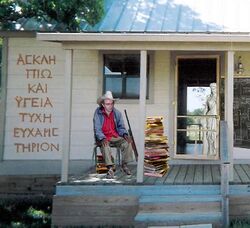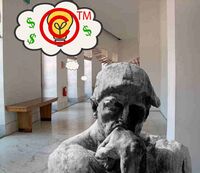Intellectual property

Intellectual Property (IP) is a piece of legal jargon referring to what is considered "hard work" and "good effort". In third world countries, the unauthorised use of "intellectual properties" is considered punishable of death, whereas in advanced countries, such as the GloriousPeople's Republic of China, citizens are encouraged to copy items of this category to pretend to be intellectual.
(Parts of this article cannot be disclosed except to the accredited business partners of the authors.)
Categories of Intellectual Property[edit]
"Intellectual property" is a long term to pronounce, and the acronym "IP" is confusingly shared by Al Gore's invention "Internet Protocal". In order to address this issue, an international agreement has been reached and all intellectual properties worldwide are further subdivided into 5 categories and referred to by their respective category names. These categories are:
- Copyright© materials
- Patent productsPatPending
- Trademarks® ™
- Industrial designsWTF
- Trade secretsSH!
Thus, the use of "intellectual property" and "IP" can now be left for the lawyers to worry about.
© Copyright[edit]
© Copyright is a protection for crappy music composed by musician wannabes and random silliness written by non-noteworthy individuals. The idea of copyright is simple: if you have a feeling that someone/thing is copying what is supposed to be your work, you sue - sue until the said entity is removed from the universe. RIAA is an attorney for such matter, although they do not protect your homework/thesis from being copied by That Guy next to you.
Examples of copyrightable material[edit]
- Fan-fiction based on a TV show (doubleplusgood if it's a parody, you can sue them for defamation as well)
- Metallica's lastest collection of random noises
- Written material searchable with Google
Various violations of copyright[edit]
- Copyleft
- Copydown
- Copywrong
- Napster
- Memorizing copyrighted music. Yeah, that's copyright infringement because you just made a personal copy... in your brain!
Patent[edit]
Patent is a piece of creative writing submittable and endorsed by a local patent office. Reading a patent application takes time - especially when the invention described is not an adult product or does not involve bikini-clad women - and thus most patent offices worldwide offer also what is know as "pending patent". Pending patent is a patent that prevents an invention from being copied or imitated, provided that the said invention has not been seen or heard by anyone except the inventor him/herself. Once the patent office has agreed on an endorsement, a pending patent becomes a real patent, which works in the same way copyright does, except the suing bit.
What you can apply a patent for[edit]
What you cannot apply a patent for[edit]
- Things that can actually be used for a real purpose (with the exception of the wheel)
Example of a patentable product[edit]
- Portable solar-powered torch (Photon-driven illumination apparatus, patent#: US 1011015)
- "The present application provides a solution for individuals and groups who are situated in an illumination-limited area, the photon-driven illumination apparatus being a portable device with an arbitrary number of photon-electricity converters. When photons from one or multiple arbitrary sources of the said quantum particles are captured by the said converters, the said photons are converted to electricity and immediately transferred to one or multiple light emitters via one or more arbitrary electricity conducting materials."
Trademark[edit]
All trademarks falls into two categories. These are:
- Registered trademark
- Common-Law trademark
Registered trademark®[edit]
Registered trademark® is a vanity manifesto registered in the local patent office's trademark records. The said manifesto could be a series of letters arranged in a strange manner, like iPod®, or simply someone's ugly face. In times, however, attempts of icon registration were made by corporate tycoons/lunatics with the view of world domination, but each time the application was wisely thrown out by the respective patent office in preventing a possible, global disaster. Here are some examples:
- Registration of the name Princess Diana: The resultant burning of literature containing unauthorised use of the said name would result in a drastic increase of greenhouse gases in the atmosphere, causing a second global deluge.
- Privatisation of Smiley face by Wal-Mart®: The said privatisation would wipe the grin off everyone's face.
- Canonisation of Your face: The application was rejected for the reason that the icon was too ugly. Besides, the patent office does not canonise useless items - only the Catholic Church does.
- Registration of the name Redskins: The Washington Redskins have been repeatedly denied a Federal Registration for their "trademark" because it is offensive to Native Americans. Solidifying his place in history as the worst owner in the history of the NFL Dan Schneider was not merely content to allow his franchise to loose on the field - he has even overseen their losses off it as well.
Common-Law trademark™[edit]
Common-Law trademark™ applies to all the things you think is trademark-able. Here are some examples:
- Highly random silliness such as AAAAAAAAA!
- Words one came up with when playing Scrabble
- All the words and phrases you can find on a Coca-Cola® can
Curiously, the actual applicable acts on Common-Law trademarking are simply a bunch of random silliness that no one cares about.
Industrial Design of Crap[edit]
Industrial design rights apply to objects one desires to but simply cannot patent or trademark. In simplicity, an industrial design is what a primate can possibly come up with. One excellect example is the masterpiece you threw together last week in a pottery lession when you were having wild fantasy with your neighbour's wife. (Is it not why you joined that stupid class in the first place, after all?) Anyway, the bottomline is: one must pay a local patent office to get a brilliant invention registered as an "industrial design".
Trade secret[edit]
Trade secret generally refers to an art of trade or apparatus employed in screcy during a business venture. Unlike other variants of IP's, trade secret does not require registration at a patent office or endorsement and declaration of any sort. Some examples are:
- Additives/genetic modifications food companies have added to their products
- Enron's account records (see also: New Math)
- Oil-for-food program kick-backs
- Watergate
A revealed trade serect is usually referred to as "scandal".
